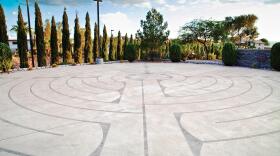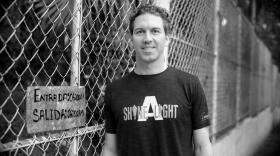If it weren’t for an impending bank debt, Bobby Dean would never have gone into the casino business. Forty-three years later, he hasn’t had regrets. A throwback to the era of the “company man,” Dean has spent the last 35 years at a single casino, overseeing its keno and bingo rooms. He’s been at Palace Station since before it was Palace Station, back when Frank Fertitta Jr. was getting it up and running as Bingo Palace.
Neither Dean’s 68 years nor spinal stenosis have slowed him down, as he swiftly navigates the casino floor in a walker. “I enjoy the work,” he says, “much more than I ever did.” Blessed with formidable memory, he remembers the exact day his parents moved to Las Vegas from Wichita Falls, Texas: Oct. 15, 1953. Then-small Sin City was hardly today’s retail magnet: “You’d have to go to L.A. to get what you needed to build a barbecue.” Classes at Dean’s elementary school would schedule recess so the students could watch A-bomb tests.
“It’s OK to get pissed off” at losing, he says, but let go of grudges. Dean had a friend who’d blow his money at the craps table, shrug, then say, “Well, I’ll go paint something Monday.” Dean paraphrases the wisdom of pioneering aviatrix Pancho Barnes: “You can be unhappy if you want it, but choose happy and keep living.” But not too happy: “Back in (the ’80s), the whole casino got a little crazy. New Year’s Eve, we actually poured champagne on the keno counter. They were pouring a champagne toast for everybody in the building. We had a little problem with keno audit. It didn’t come out right at the end of the shift. Somebody must have had a second glass of champagne. Finally we decided that wasn’t the greatest idea in the world when people are trying to count money.”
Going into full-time casino employment was the last thing on Dean’s mind in 1970. He was studying at UNLV, fixing airliners at McCarran International Airport and becoming rated as a flight instructor. Then he needed to make a payment on his truck, stat. Serendipitously, a keno writer at the Hacienda was a no-show and Dean’s destiny was set. Until that fateful day, Dean had spent several years bouncing between engineering classes, part-time jobs and overseas duty during the Vietnam War. “Not being too smart and not realizing that the Army has more planes than the Air Force,” he says, he enlisted with the latter and found himself supporting the 355th Tactical Fighter Wing out of Takkhli Royal Air Force Base in Thailand. The 355th’s F-105 Thunderchiefs would attack North Vietnamese infrastructure and interdict supplies in the morning and Dean would patch them up in the afternoon. “I enjoyed the Air Force fighters because they were small planes,” Dean explains. “You get to know the whole thing.”
The reluctant casino returnee discovered he enjoyed working for Hacienda owner Judy Bayley, but the “First Lady of Gambling” died on New Year’s Eve in 1971 and the Hacienda fell under the control of Mob patsy Allen Glick. “I didn’t like the philosophy there at all,” Dean recalls. “This was starting to feel like a noose” — he holds his floridly patterned necktie up like a hangman’s knot. Glick’s underlings “didn’t particularly trust the people in the keno game,” whom they suspected of stealing. Deliverance, in the form of Bingo Palace, presented itself on Dec. 1, 1976.
Dean credits wife JoAnne, whom he married in 1976, with talking him out of becoming a table game executive and running the bingo hall along with the keno room, being an avid bingo player herself. While he acknowledges that bingo is “small potatoes” in the casino world, it does draw its share of colorful characters — like the man who brought his teddy bear to every session. “He didn’t play bingo,” Dean explains. “His teddy bear did.”









